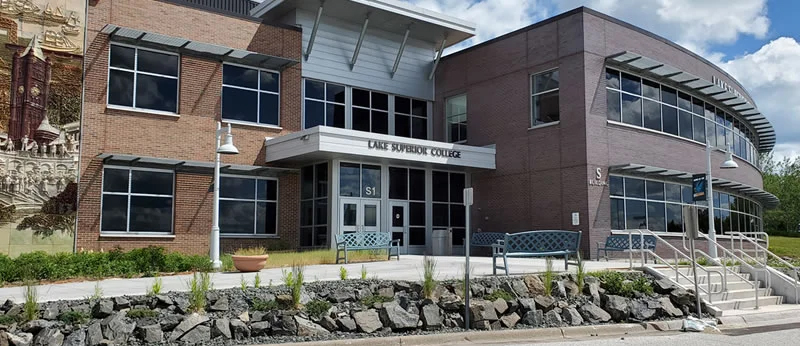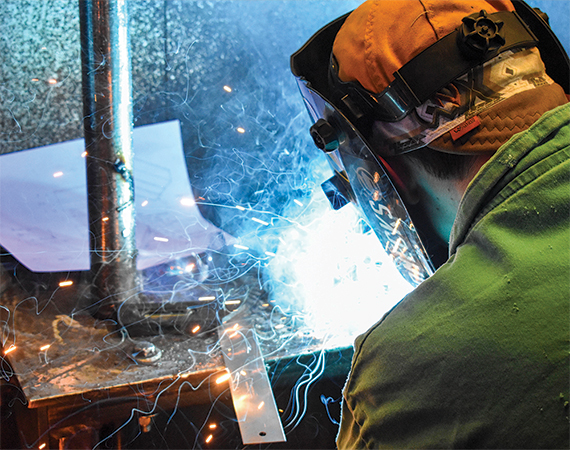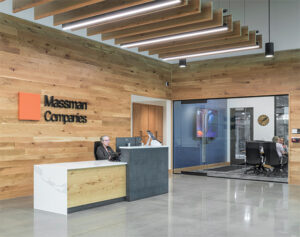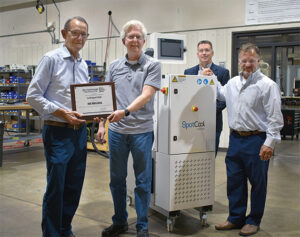Lake Superior College (LSC) can attest that sometimes opportunity springs from a potential crisis.
The college was forced to scramble when it learned last year that it would lose the rented space in downtown Duluth it had long used to house its manufacturing programs. It’s not that relocating LSC’s manufacturing programs seemed like a bad idea, says David Kline, LSC’s vice president of advancement and external relations, but the speed of that transition posed a challenge.
“We had been dreaming about having the manufacturing programs leave downtown for years,” he says. But the quicker than anticipated turnaround meant “our dreams ended up becoming a minor emergency.”
Kline says the college had socked away about $4.5 million in anticipation of an eventual move, but it was nowhere near enough to underwrite the project. So, the school stepped back and threw what Kline refers to as “a Hail Mary pass.”
LSC successfully marshalled support from local lawmakers and the Minnesota State college system, eventually securing $8.3 million in state bonding funds.

The alternative seemed unthinkable to Kline.
“The Twin Ports community needs a lot of the workers we’re training, and if you have to go dark because of something like this, it would not go over very well. It would sort of look like we couldn’t find our way out of a paper bag,” he says.
The need for LSC graduates has become even more profound in a tight labor market and at a time when many skilled workers are reaching retirement. Suspending the programs, even temporarily, likely would have produced harmful ripple effects throughout the region.
“We wanted to do what’s right not only for our students but for the community as a whole,” Kline says.
While LSC ultimately received the financial support needed to sustain operations, its path forward has been far from smooth.
Originally, the school had hoped to open its new shop by the time students returned for fall classes in 2024, but that timeline has slipped, with completion now expected in January 2025.
The project involves an 8,310-square-foot expansion and renovation of LSC’s T Building at its main campus, atop Trinity Road.
The same building also is home to LSC’s automotive, carpentry, electrical, and computer science/cybersecurity studies. When complete, the footprint of LSC’s main campus will have grown by about 10%.
LSC has reshuffled its curriculum a bit in the interim.
Many students entering LSC’s CNC machine and welding programs began their coursework in 2024 with classes that don’t necessarily require hands-on machine experience, such as blueprinting, safety, and communication studies.
CAD studies have transferred pretty seamlessly into classroom space already available on campus, Kline says.
Meanwhile, LSC was able to arrange student access to equipment on the manufacturing floors of local partners. Moline Machinery and IPS Cranes are two companies that have stepped up to help.
“Both are providing great experiences for our students,” according to LSC instructor Nate Zobel, who says he has been able to work in concert with on-site supervisors to ensure their on-the-job tasks reinforce concepts students continue to learn through their classroom studies.
Kline says LSC values and relies on the private sector to tell the school how well it is preparing students for the workforce and to sometimes recommend curriculum changes.
Kline says the school benefited from long-standing relationships with industry advisory committee partners, and notes: “They’re paying off now, in our time of need.”
Kline says LSC’s student enrollment has held fairly steady as excitement about moving into a new space builds, but he admits some, not many, students have transferred.
“This short-term pain is really for long-term gain,” he says.
Kline predicts the new shop space will help attract more students, drawing them into manufacturing fields. He also suspects it will help the school recruit and retain faculty.
Even after the expansion is completed, Kline says LSC’s work will not stop.
Machine shops are expensive, he notes.
“You’re dealing with hundreds of thousands of dollars of equipment. So, getting the building done is certainly our Phase I focus. But Phase II is to get the best equipment in there.”
LSC has what Kline refers to as “a wish list” it’s hoping to fund with help from matching grants, which could leverage support from its local industry partners “to get the kind of equipment that they want to see us training students on.”
Despite the college administration’s desire for additional new equipment, LSC certainly won’t be lacking what it needs straight out of the gate. Kline says gear and machinery from the old downtown campus have been placed in temporary storage and remain ready for moving day.
Relocating some of the heavy equipment, weighing several tons, proved a logistical challenge, both in terms of extricating it from the downtown site and then hauling it up Duluth’s steep hillside to the main college campus.
However, Kline says, LSC’s capable staff demonstrated they were more than equal to the task.
Return to the Winter 2024 issue of Enterprise Minnesota® magazine.


